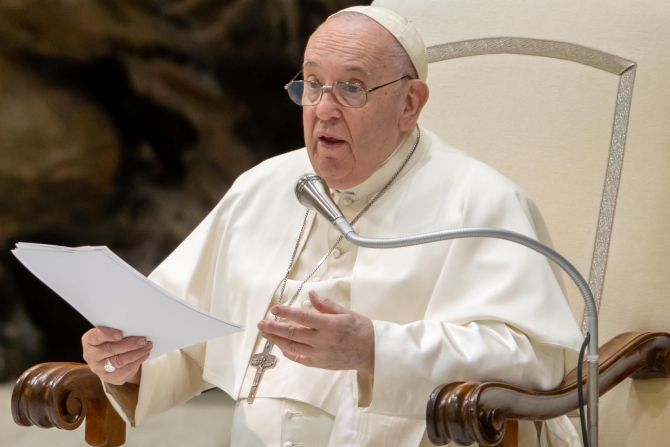Pope Francis said Wednesday that the traditions of the Church should not be based on opinion or ideological leanings but on whether they favor the proclamation of the Gospel.
“Everything in the Church must be conformed to the requirements of the proclamation of the Gospel; not to the opinions of the conservatives or the progressives, but to the fact that Jesus reaches people’s lives,” he said Feb. 22.
Pope Francis asked: When there are ideological divisions in the Church, such as an identification as conservative or progressive, “where is the Holy Spirit?”
“Be careful,” he warned. “The Gospel is not an idea; the Gospel is not an ideology. The Gospel is a proclamation that touches the heart and makes the heart change. You are making the Gospel a political party, an ideology, a club.”
The pope’s weekly general audience took place in a full Paul VI Hall on Ash Wednesday, the first day of the penitential Lenten season.
Speaking to pilgrims from around the world, he said, “Every choice, every use, every structure, and tradition [of the Church] is be evaluated on the basis of whether they favor the proclamation of Christ.”
“In this way the Spirit sheds light on the path of the Church, always. In fact, he is not only the light of hearts; he is the light that orients the Church: he brings clarity, helps to distinguish, helps to discern,” he said. “This is why it is necessary to invoke him often; let us also do so today, at the beginning of Lent.”
To illustrate his point, Pope Francis recalled “a pivotal moment” from the early Church, recounted in the Acts of the Apostles.
The apostles were worried about what to do with pagans who became Christian, but were not part of the Jewish people: “Were they or were they not bound to observe the prescriptions of the Mosaic Law?”
To resolve this problem, the apostles gathered in what was called the Council of Jerusalem, the first Church council in history, he explained.
The apostles “might have sought a good compromise between tradition and innovation: some rules are observed, others are left out,” he said, but what they did instead was “adapt to the work of the Spirit.”
“And so,” he continued, “removing almost every obligation related to the Law, they communicate the final decisions, made — and they write this — by ‘the Holy Spirit and by us’ (cf. Acts 15:28).”
“This is how the apostles always act,” he underlined. “Together, without being divided, despite having different sensitivities and opinions, they listen to the Spirit.”
Pope Francis asked everyone to think about whether they pray often to the Holy Spirit, or if they only speak to Jesus and the Father, or invoke the Virgin Mary and the saints, in their prayers.
“Because, as Church, we can have well-defined times and spaces, well-organized communities, institutes and movements, but without the Spirit, everything remains soulless,” he said. “The organization … is not enough. It is the Spirit who gives life to the Church.”
“The Church, if it does not pray to him and invoke him, closes in on itself, in sterile and exhausting debates, in wearisome polarizations, while the flame of the mission is extinguished,” he added.
The pope called it sad to see the Church operate as if it is just a parliament, when it is really a community of men and women who believe in and proclaim Jesus Christ, guided by the Holy Spirit, not their own reason.
“The Spirit makes us go out, urges us to proclaim the faith in order to confirm ourselves in the faith, to go on mission to discover who we are,” he said. “That is why the Apostle Paul recommends: ‘Do not quench the Spirit’ (1 Thessalonians 5:19).”
“Let us pray to the Spirit often, let us invoke him, let us ask him every day to kindle his light in us,” he urged. “Let us do this before each encounter, to become apostles of Jesus with the people we find.”
